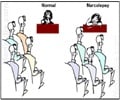Obstructive sleep apnea, the disruption of normal breathing during sleep increases daytime sleepiness and may be associated with cognitive impairment.
Highlights
- Older adults tend to fall asleep during the day and the prevalence is 50%.
- Recurrent awakenings due to disrupted breathing leads to excessive sleep during the day.
- Obstructive Sleep apnea was more common in adults aged over 65 with cognitive impairment.
"Although this does not necessarily mean that sleep apnea causes cognitive impairment in the elderly, it does highlight the association," explained corresponding author Sanford Auerbach, MD, associate professor of neurology and psychiatry at BUSM and director of the Sleep Disorders Center at Boston Medical Center.
According to Auerbach the causal link between SDB /obstructive sleep apnea (OSA) and cognitive impairment in the elderly is not entirely clear.
"Nevertheless, it does raise the issue that clinicians evaluating OSA in the elderly should screen for cognitive impairments. Furthermore, clinicians evaluating cognitive impairment in the elderly should also screen their patients for sleep disturbance and OSA."
Even though it is not clear that treatment of OSA will delay or prevent the cognitive impairment and possible development of dementia, Auerbach believes that treatment of OSA will certainly improve the quality of life for these patients.
- Sanford Auerbach and Kristine Yaffe, The link between sleep-disordered breathing and cognition in the elderly, Americal Academy of Neurology (2016), http://dx.doi.org/10.1212/WNL.0000000000003577.
- Jana R. Cooke and Sonia Ancoli-Israel, Normal and Abnormal sleep in the Elderly. Handbook of Clinical Neurology (2012) 10.1016/B978-0-444-52006-7.00041-1.
Source-Medindia















